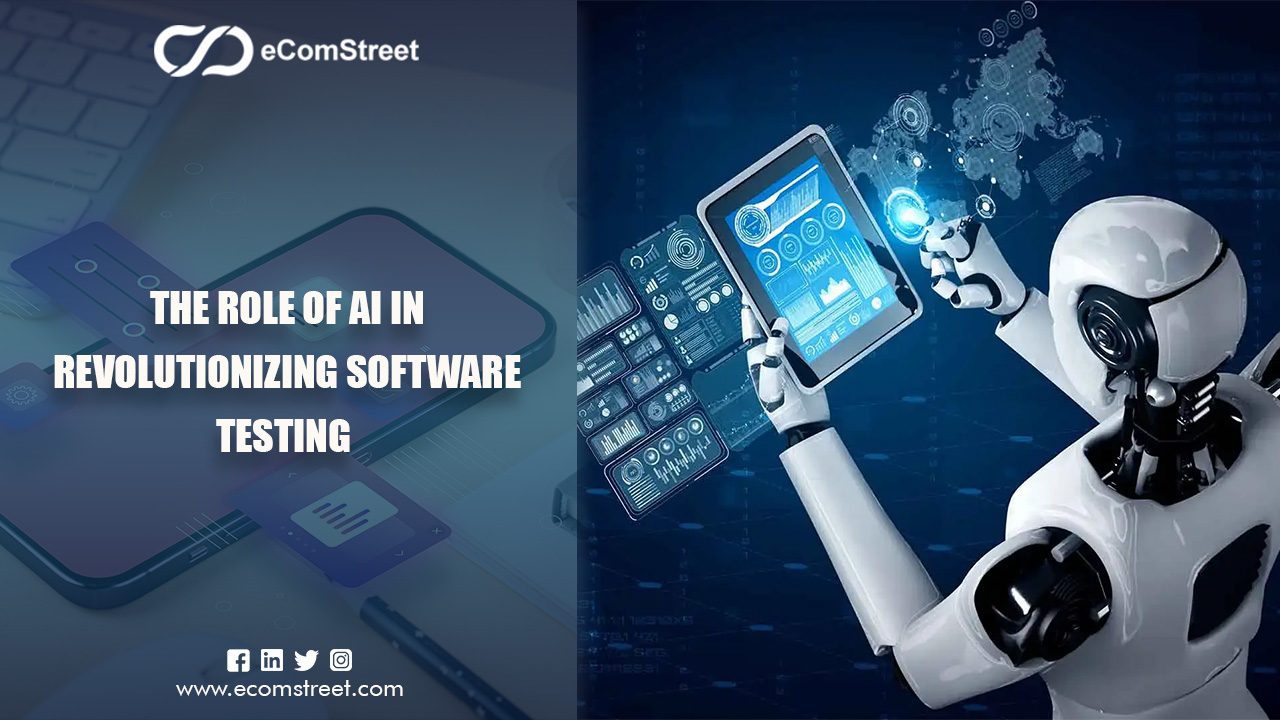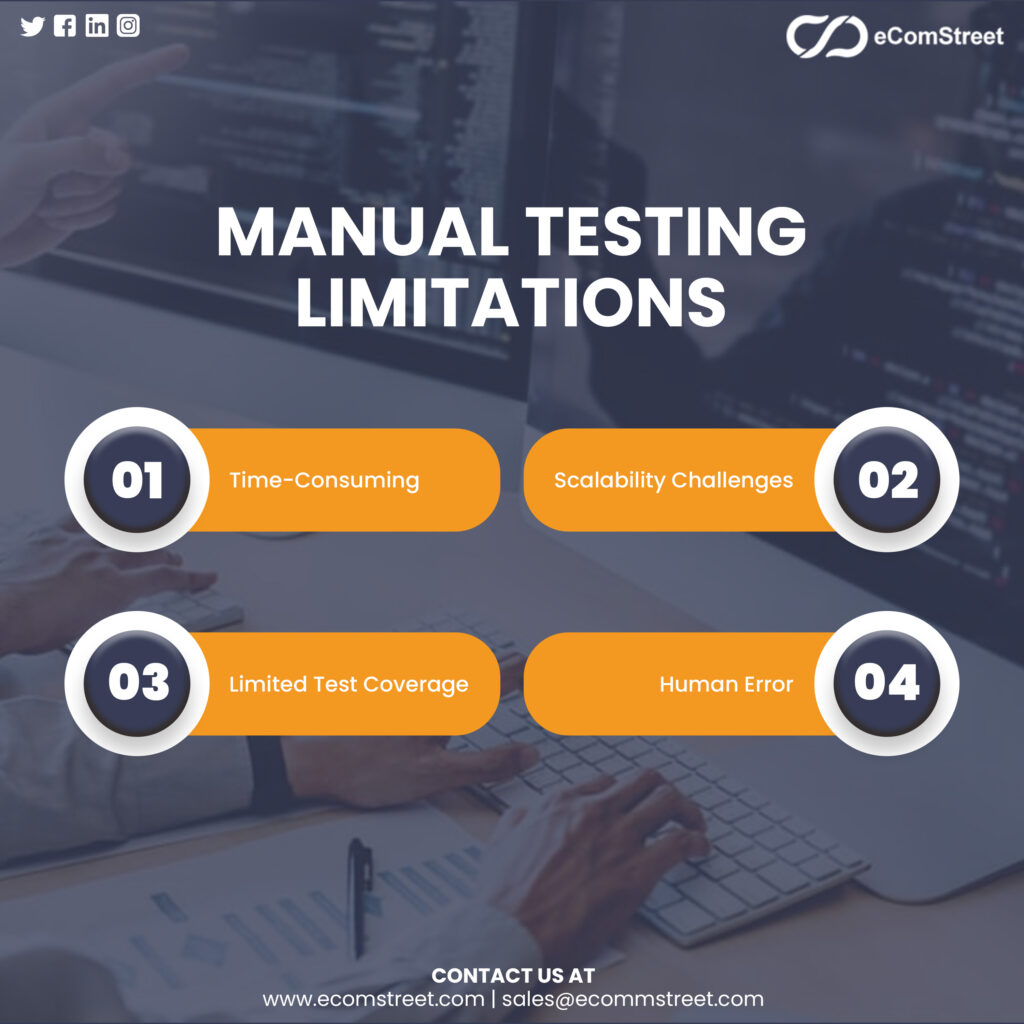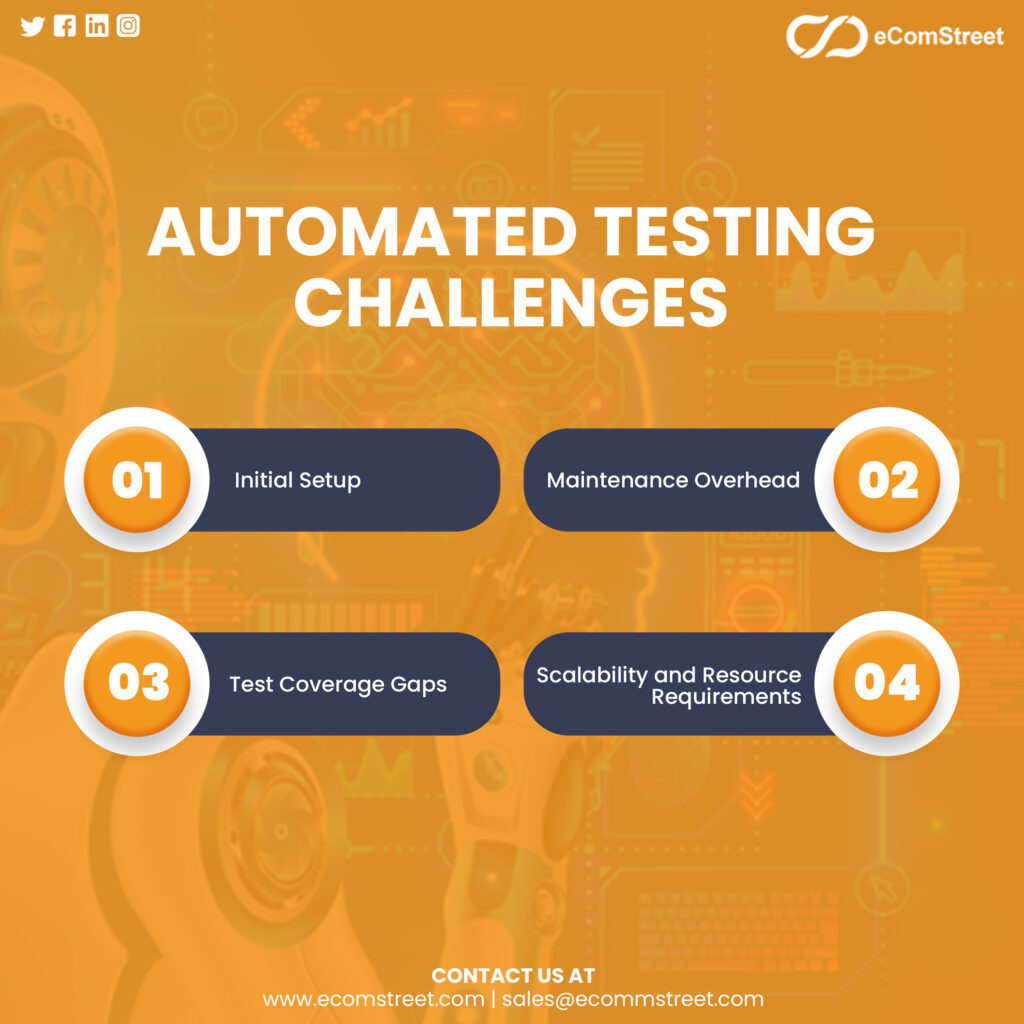The Role of AI in Revolutionizing Software Testing
Technology

In a world full of high-tech gadgets, software applications play a crucial role in the functions of these devices. AI in web development has become increasingly essential in ensuring that software applications meet their intended purpose, perform seamlessly, and are free from errors and vulnerabilities. Software testing, a critical phase in the software development lifecycle, faces new challenges as the demand for software grows, and its complexity continues to soar. Therefore, traditional software testing methods are facing difficulties in handling modern-day problems.
This is where Artificial Intelligence (AI) comes into play and has revolutionized the software world. AI is ushering in a new era in software testing, offering innovative solutions to address the growing complexities and the need for more efficient and effective testing processes.
In this blog, we will delve into AI's pivotal role in transforming traditional software testing practices, highlighting its potential to enhance quality, reduce time-to-market, and revolutionize how we ensure software application reliability.
The Traditional Challenges in Software Testing
In the rapidly evolving landscape of software development, the significance of scalable and robust software testing cannot be overstated, especially with the emergence of AI tools for mobile app development. Traditional software testing methodologies encounter numerous challenges and limitations in this dynamic environment. It has become imperative to address these challenges and adapt testing practices to align with the evolving demands of modern businesses, leveraging the power of AI tools for more efficient and effective mobile app development.
1. Manual Testing Limitations
Manual testing is the foremost form of software testing, executing its testing process manually. It has its advantages and limitations:

- Time-Consuming: Manual testing can be time-consuming, especially involving repetitive tasks or regression testing. Testers must carefully navigate various scenarios, making it impractical for projects with tight deadlines.
- Limited Test Coverage: Human testers are prone to oversight and may only be able to test scenarios or edge cases comprehensively. This little test coverage can lead to critical issues slipping through the cracks.
- Scalability Challenges: As software projects grow in complexity, the number of test cases multiplies exponentially. Manual testing needs to scale efficiently, resulting in delays and resource bottlenecks.
- Human Error: Testers are susceptible to human error, whether overlooking a critical test case or making a mistake during execution. These errors can compromise the accuracy of testing results.
2. Automated Testing Challenges
Recognizing the limitations of manual testing, the software industry has increasingly adopted automated testing, which involves using scripts and testing tools to execute test cases. While automation offers several advantages, it is not without its own set of challenges:

- Initial Setup: Developing and maintaining automated test scripts can be time-consuming and require a significant upfront investment. This can deter some organizations from adopting automation.
- Maintenance Overhead: Automated test scripts need regular updates to keep pace with evolving software applications. Changes in the software's user interface or functionality can break existing scripts, necessitating ongoing maintenance efforts.
- Test Coverage Gaps: Like manual testing, automated testing can miss subtle or unexpected issues not covered by predefined test scripts.
- Scalability and Resource Requirements: Automation can alleviate some scalability issues but still requires dedicated resources and infrastructure for script development and execution.
Both manual and automated testing methodologies face challenges related to time, test coverage, scalability, and human error. As software applications become increasingly intricate and development cycles shorter, seeking innovative solutions to overcome these limitations has become imperative.
This is where Artificial Intelligence (AI) steps in, offering the potential to revolutionize software testing by addressing these challenges head-on. In the following sections, we will explore how AI is poised to transform the software testing landscape by leveraging its automation capabilities, intelligent test case generation, and data-driven analysis.
The Rise of AI in Software Testing
Artificial Intelligence (AI) is a term that has permeated nearly every facet of our digital world, from virtual assistants to self-driving cars. But what exactly is AI, and how is its presence felt in software testing? In this section, we'll explore how AI is rising to revolutionize software testing and the myriad benefits it brings to the table.
Understanding AI in Software Testing
In the context of software testing, AI refers to the application of machine learning and advanced algorithms to automate and enhance various testing processes. It leverages computational power and data-driven insights to make testing more efficient, accurate, and adaptable. Here's how AI is being applied to different aspects of software testing:
- Test Automation: AI-powered test automation frameworks are becoming increasingly popular. These frameworks use machine learning to identify and create test cases, execute tests, and analyze results. They can adapt to changes in the software, reducing maintenance efforts.
- Intelligent Test Case Generation: AI can generate test cases intelligently by examining the application's code, user interfaces, and historical data. This ensures that test coverage is more comprehensive, including edge cases that manual testers might overlook.
- Defect Prediction: AI can predict defects by analyzing historical data and identifying patterns. This allows testers to focus their efforts on high-risk areas of the software, improving efficiency.
- Test Data Management: AI can generate and manage test data, making it easier to simulate real-world scenarios during testing. It can also help in data anonymization and compliance with data protection regulations.
Benefits of AI in Software Testing
The adoption of AI in software testing comes with a plethora of advantages that are reshaping the landscape of quality assurance:
- Speed and Efficiency: AI-powered testing can execute test cases at a pace that's simply unattainable through manual testing. This accelerated testing process is particularly beneficial in today's fast-paced development cycles.
- Accuracy and Consistency: AI stays energized, doesn't, energized, and focused. It executes test cases precisely, ensuring that the same tests are consistently and accurately repeated, reducing the chances of human error.
- Improved Test Coverage: AI can analyze vast amounts of code and data to identify test scenarios that human testers might overlook. This leads to more comprehensive test coverage, reducing the likelihood of critical issues slipping through the cracks.
- Cost Reduction: While there is an initial investment in implementing AI-based testing solutions, the long-term benefits include reduced testing time, fewer defects reaching production, and lower maintenance costs.
- Enhanced Quality: AI can detect subtle defects, security vulnerabilities, and performance bottlenecks that might go unnoticed in manual testing. This results in higher-quality software products.
Challenges and eComstreet's Considerations in Harnessing AI for Software Testing
Like any other technology, integrating AI in software testing comes with challenges, and it needs high-tech solutions to fulfill modern-day problems. eComstreet, a leading Software Development Company, holds a team of experts with years of experience in testing. In this section, we will see some challenges and their considerations from eComstreet's testing experience.
Specialized Skills Requirement
Challenge: One of the initial hurdles in adopting AI for software testing is the need for specialized skills. Implementing AI-driven testing methodologies requires a workforce with the knowledge and expertise to navigate this technological terrain. From data scientists who can design and train machine learning models to testing professionals capable of interpreting AI-generated results, there's a learning curve associated with AI integration.
Consideration: To address this challenge, we have invested resources to train and upskill our team. An organization grows when its team upgrades its skills occasionally. We have AI and machine learning certification courses that our team can pursue. Additionally, we foster a collaborative environment where testing and AI teams work together, which helps to bridge the skills gap.
Tool Selection and Integration
Challenge: Selecting the right AI-powered testing tools is another critical challenge. The market is flooded with AI-based testing solutions, each claiming to be the best. Determining which tools align with your organization's needs and existing infrastructure can take time and effort. Furthermore, integrating these tools seamlessly into your software development pipeline can pose compatibility challenges.
Consideration: Before diving headfirst into AI adoption, we comprehensively evaluate available AI automation tools. Considering factors like scalability, compatibility with your existing tech stack, ease of integration, and the level of support the tool's vendor provides. We must choose tools that align with your long-term goals and can grow alongside your organization.
Data Quality and Privacy Concerns
Challenge: AI for QA testing thrives on data, and software testing is no exception. It relies heavily on historical testing data to identify patterns and make predictions. However, ensuring the quality and security of this data, especially in a world increasingly concerned with data privacy, can be challenging. Organizations must navigate the delicate balance between leveraging valuable data and protecting sensitive information.
Consideration: We establish robust data governance practices that outline data collection, storage, and usage protocols. We ensure compliance with data privacy regulations like GDPR or CCPA, depending on your jurisdiction. Our team anonymizes or pseudonymizes sensitive data whenever possible and encrypts data in transit and at rest to safeguard against breaches.
Maintaining Human Oversight
Challenge: While AI for software testing can significantly enhance the efficiency of software testing, it's essential to strike a balance between automation and human oversight. Relying solely on AI may lead to blind spots and false positives, as AI models may not comprehend the nuances of user behavior and software requirements as well as humans do.
Consideration: Our testers implement a hybrid testing approach that combines the strengths of AI-driven testing with human intuition. They provide a valuable context and insight that AI might miss. We assign a dedicated tester to review AI-generated test cases and results to ensure a comprehensive testing process.
Cost and Resource Allocation
Challenge: Integrating AI into your software testing process isn't without its costs. From acquiring the necessary hardware and software to training personnel and maintaining AI systems, the financial aspect can be a significant challenge. Organizations must carefully budget and allocate resources to maximize the benefits of AI.
Consideration: We create a detailed cost-benefit analysis to justify AI adoption. We are determining the expected return on investment (ROI), establishing clear metrics for measuring AI's impact on software testing efficiency and quality, and starting with pilot projects to assess the feasibility and cost-effectiveness of AI integration before scaling up.
Conclusion: The AI Revolution in Software Testing
AI plays a crucial role in changing how we test software in the fast-changing world of software development. It's not just another tool; it's a significant shift in ensuring software works well. AI helps by doing repetitive tasks, making testing smoother, and improving our work. This means we can make software faster, adapt to industry changes, and create top-notch software. AI isn't a far-off idea; it's happening now in software testing. To stay ahead in the software industry, we need to learn about AI in testing and use it to our advantage. It's like having a powerful partner that makes our software even better.
In this age of AI in automation testing, continuous learning and adaptability are paramount. Regardless of your role in software development, staying updated on AI advancements in testing is essential. Embrace AI as a collaborative partner in your software testing journey. By doing so, you streamline your processes and ensure your software products meet the highest standards. The role of AI in revolutionizing software testing is here to stay, and by harnessing its power at eComstreet, we can collectively shape a future where software testing isn't just a process but a beacon of excellence and innovation in the industry.

Author
Manas Singh
Designation : Sr.Full Stack Developer
Having 11+ years of experience in application development domain, now he is working on Web3 and blockchain technology. He is having sound knowledge of Solidity language and building smart contracts.